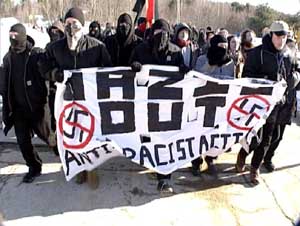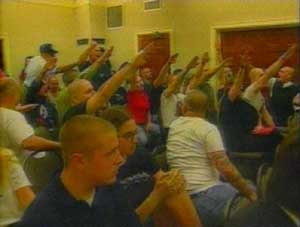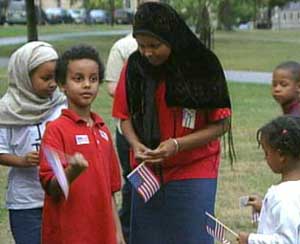| |
SYNOPSIS
 A firestorm of controversy erupts when Lewiston, Maine Mayor Larry Raymond sends an open letter to the 1,100 newly arrived Somali refugees informing them that the city’s resources are strained to the limit and asking them to tell other Somalis not to move to the city. Interpreted as racism by some and a rallying cry by white supremacist groups across the United States, The Letter: An American Town and the “Somali Invasion” documents the ensuing cross-current of emotions and events, culminating in a “hate” rally convened by The World Church of the Creator and a counter “peace” rally involving nearly 4,000 Lewiston residents supporting ethnic and cultural diversity.
A firestorm of controversy erupts when Lewiston, Maine Mayor Larry Raymond sends an open letter to the 1,100 newly arrived Somali refugees informing them that the city’s resources are strained to the limit and asking them to tell other Somalis not to move to the city. Interpreted as racism by some and a rallying cry by white supremacist groups across the United States, The Letter: An American Town and the “Somali Invasion” documents the ensuing cross-current of emotions and events, culminating in a “hate” rally convened by The World Church of the Creator and a counter “peace” rally involving nearly 4,000 Lewiston residents supporting ethnic and cultural diversity.
Hamzeh Mystique Film’s feature-length documentary explores what American news outlets have dubbed the "Somali invasion" of Lewiston, Maine – an insulated, predominantly white former mill town struggling to maintain its equilibrium in the wake of the 9/11 tragedy.
DIRECTOR’S STATEMENT
 Like many before me, I arrived in the United States after taking a circuitous, sometimes dangerous route through life. Young, alone and penniless, everything I owned was packed into the one suitcase I carried. Yet guided by a dream of a better life, I stepped ashore confident that I could escape the pains of my past. America became my haven. I fell in love with this country and gained an unparalleled admiration for, and commitment to, all of the greatness of this land and its people.
Like many before me, I arrived in the United States after taking a circuitous, sometimes dangerous route through life. Young, alone and penniless, everything I owned was packed into the one suitcase I carried. Yet guided by a dream of a better life, I stepped ashore confident that I could escape the pains of my past. America became my haven. I fell in love with this country and gained an unparalleled admiration for, and commitment to, all of the greatness of this land and its people.
When the refugees from Somalia began arriving in the U.S. after the civil strife of 1993, I was hopeful that they too would find America to be a country where they could live, work, and raise their families without fear. I hoped they would find what I had found in this great country: opportunity and acceptance.
After the Somalis came to the U.S., they soon found themselves living much the way many poor minority groups live here, crowded into economically disadvantaged areas of big cities like Chicago, Detroit and Atlanta. In their new neighborhoods they were forced to confront the ravages of poverty: drugs, violence and crime. Not wanting to compromise their strong family ethics, they searched for a community in which to live that embodied all of the values they held dear. They settled on the town of Lewiston, Maine – a town I personally knew to be friendly and hospitable. One thousand one hundred Somalis from all over the country made the trip to their newly adopted “hometown”.
At first warmly welcomed by the community, seeds of fear and distrust soon began to sprout among some townspeople. Was it that the Somalis were black? Was it their Muslim religion? Was it the foreign language they spoke? Was it the fear that these new residents would be welfare dependent, competing for the same economic resources many locals also depended upon?
 A firestorm of controversy suddenly erupted when Lewiston’s Mayor Larry Raymond, publicly stating what some felt privately, sent an open letter to the Somali elders advising them that the city’s resources were strained to the limit and asking them to tell friends and family not to move into the city. The letter’s content was interpreted as racism by some and a rallying cry by white supremacist groups across the country. The international media dubbed the situation the “Somali invasion” and soon descended upon Lewiston, exacerbating an already inflamed situation. The Somalis closed themselves off from the media. Local government officials suddenly became quiet. The white supremacists, seeing a venue for their own agenda, swooped into town and many ordinary citizens became even more threatened and fearful.
A firestorm of controversy suddenly erupted when Lewiston’s Mayor Larry Raymond, publicly stating what some felt privately, sent an open letter to the Somali elders advising them that the city’s resources were strained to the limit and asking them to tell friends and family not to move into the city. The letter’s content was interpreted as racism by some and a rallying cry by white supremacist groups across the country. The international media dubbed the situation the “Somali invasion” and soon descended upon Lewiston, exacerbating an already inflamed situation. The Somalis closed themselves off from the media. Local government officials suddenly became quiet. The white supremacists, seeing a venue for their own agenda, swooped into town and many ordinary citizens became even more threatened and fearful.
This story and the plight of these good Somalis became my obsession. I set out searching for the truth, tracing the events that led to the chaotic, roiling, dark cloud that engulfed this city – a city I thought I knew so well. What had happened? Why did things change so drastically, so quickly? Is there one ultimate truth that serves as the answer?
By making The Letter I offer a comprehensive look at the dynamics of immigration many cities and countries worldwide now confront in this age of “globalization”, and the clash of alien cultures and religions that inevitably follows.
Ziad H. Hamzeh
DIRECTOR’S BIOGRAPHY
 Identified by The Los Angeles Times as “someone to watch”, Ziad’s work has earned over thirty trade awards for directing and producing, including the Kennedy Center Meritorious Achievement Award for Directing, The Chairman’s Award from Who’s Who Among Outstanding Americans, and the Medal of Honor from the Syrian government. Most recently his work includes The Letter, the highly controversial feature-length documentary dealing with what the media has dubbed the "Somali invasion" of Lewiston, Maine, Shadow Glories, the multi-award winning feature film (Best of Festival/Best Feature Film: Dances With Films Festival, Best Feature Film: Woods Hole Film Festival, Grand Prize for Editing: Rhode Island International Film Festival), Eternal Embrace for Unicorn Shadow Productions, Cubs for Mystique Films, and he’s currently developing the feature films Suspended, Tangled Up In Blu, and Pegasus Wings. Ziad has also been sought out to write and direct highly successful television commercials for Kirin Beer, Pleasant Farms, and Battered Women of America, as well as dramas such as Baal, Poor Murderer, Silent Knock and the film pilots LHR, El Amor Brujo, and The Party Host.
Identified by The Los Angeles Times as “someone to watch”, Ziad’s work has earned over thirty trade awards for directing and producing, including the Kennedy Center Meritorious Achievement Award for Directing, The Chairman’s Award from Who’s Who Among Outstanding Americans, and the Medal of Honor from the Syrian government. Most recently his work includes The Letter, the highly controversial feature-length documentary dealing with what the media has dubbed the "Somali invasion" of Lewiston, Maine, Shadow Glories, the multi-award winning feature film (Best of Festival/Best Feature Film: Dances With Films Festival, Best Feature Film: Woods Hole Film Festival, Grand Prize for Editing: Rhode Island International Film Festival), Eternal Embrace for Unicorn Shadow Productions, Cubs for Mystique Films, and he’s currently developing the feature films Suspended, Tangled Up In Blu, and Pegasus Wings. Ziad has also been sought out to write and direct highly successful television commercials for Kirin Beer, Pleasant Farms, and Battered Women of America, as well as dramas such as Baal, Poor Murderer, Silent Knock and the film pilots LHR, El Amor Brujo, and The Party Host.
In Los Angeles Ziad created two extraordinary theatres: The Open Fist Theatre and The Egyptian Arena. As artistic director of these award-winning venues, Ziad brought to the Los Angeles theatre community many prestigious international names such as Brecht, Beckett, Artue, Arrabel, Lorca, Gretzky, and Churchill. He has directed and produced over sixty major award winning stage productions, among them Roxy Ventola’s After The Bomb, Poor Murderer, Brecht’s Baal, Sam Shephard’s True West, Car Cemetery, The Architect and Empress of Assyria, Cinders, Shakespeare’s Hamlet, The Bitter Tears of Petra Von Kant, Tennessee Williams’ Vieux Carre, Nicholas Kazan’s Blood Moon, Low Level Panic, and Dusa, Fish, Stas, and Vi. Ziad’s work has been seen in many worldwide venues, including The Barnsdale Gallery, The Celtic Arts Center, Harmony Gold Studios, The Los Angeles Theatre Center, and The Harvard Film Archive.
 Ziad has mentored and empowered many new artists: Burr Steers, writer and director of the highly touted Igby Goes Down, starring Susan Sarandon and Jeff Goldblum; Juan Carlos Valdivia, creator of his breakthrough film Juno and the Pink Whale; Marc Sandler, actor, producer, and screenwriter of the multi-award winning feature film Shadow Glories, and feature film writer, director and producer Tony Spiridakis (Queens Logic) – all found a haven for their creative powers when joining Ziad at The Open Fist. Ziad developed and produced Spiridakis’ play The Last Word prior to Tony directing it as a feature film. Dalene Young, Kirsten Eykle, and many others have developed their talents under his guidance. Ziad also teaches aspiring graduate and undergraduate students in directing, acting and writing for film at many prestigious institutions, including The Maine International Film and Television Workshops and Rockport College.
Ziad has mentored and empowered many new artists: Burr Steers, writer and director of the highly touted Igby Goes Down, starring Susan Sarandon and Jeff Goldblum; Juan Carlos Valdivia, creator of his breakthrough film Juno and the Pink Whale; Marc Sandler, actor, producer, and screenwriter of the multi-award winning feature film Shadow Glories, and feature film writer, director and producer Tony Spiridakis (Queens Logic) – all found a haven for their creative powers when joining Ziad at The Open Fist. Ziad developed and produced Spiridakis’ play The Last Word prior to Tony directing it as a feature film. Dalene Young, Kirsten Eykle, and many others have developed their talents under his guidance. Ziad also teaches aspiring graduate and undergraduate students in directing, acting and writing for film at many prestigious institutions, including The Maine International Film and Television Workshops and Rockport College.
KEY CREDIT LIST
| Writer / Director |
................. |
Ziad H. Hamzeh |
| Producers |
................. |
Ziad H. Hamzeh, Bert Brown, Marc Sandler |
| Executive Producer |
................. |
Paul F. Harron, Jr. |
| Lead Videographer |
................. |
Joe Chabot |
| Edited by |
................. |
Ziad H. Hamzeh, Franco Sacchi |
| Music by |
................. |
Kareem Roustom, ARC Music Publishing International,
Moreffah Music Publishing (BMI) |
| Archival Footage |
................. |
News 8 WMTW TV, Portland, ME
CNN Image Source |
To be added to our announcement list
please fill in our contact form.
|
|